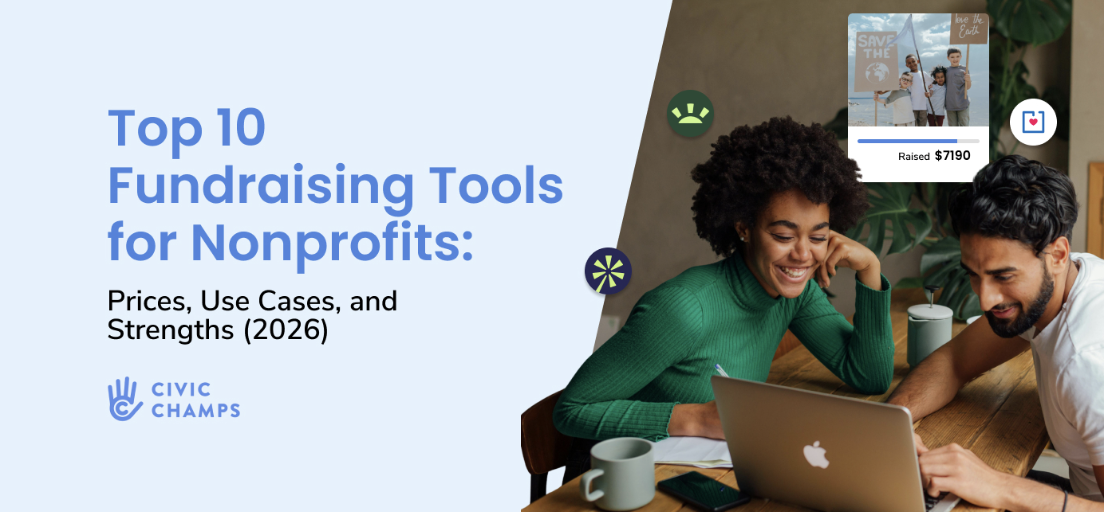Volunteers are key to the success of your nonprofit’s fundraising efforts. With effective volunteer management, you ensure your volunteers are prepared to take on their roles and raise awareness for your cause.
Depending on the type of fundraiser you’re hosting, you may have different things you’d like volunteers to keep in mind. Let’s say you’re launching a product fundraiser, in which volunteers sell a product to raise money for your organization. You may sell snacks like popcorn, branded merchandise, discount opportunities, or something else entirely.
Since this type of fundraiser involves a sales element, you’ll want to train volunteers to act as sales representatives of your organization, even if they have no prior sales experience. In this guide, we’ll provide five product fundraiser tips that you can share with your volunteers before your campaign so they have everything they need to succeed.
1. Understand the organization’s cause.
According to 360MatchPro, 83% of people volunteer to contribute to a cause they care about. While your volunteers may care deeply about your cause already, it’s important to ensure they understand all facets of your work and what sets you apart from other organizations.
To help volunteers gain a better understanding of your cause, share the following resources with them:
- Your mission statement. This statement should encapsulate your organization’s purpose in just a sentence or two. For example, a nonprofit cheerleading team for at-risk youth may have a mission statement similar to this: “Our mission is to help children get active, feel supported in a safe environment, and secure a brighter future through cheerleading.”
- About page on your website. Direct volunteers toward the About section of your website to learn more about the history of your nonprofit and the specific services your organization provides.
- Beneficiary testimonials. Sometimes, there’s no better way to learn about an organization than from its beneficiaries. Whether you have recorded interviews with beneficiaries or a few notable quotes, these testimonials can help volunteers understand the true impact of your work.
When volunteers know the full range of services your nonprofit provides and how they help your beneficiaries, they’ll be more engaged, enthusiastic, and ready to start fundraising for your organization.
2. Familiarize yourself with the product.
Like any customer service representative, product fundraiser volunteers should know the product they’re selling like the back of their hand.
If you’re selling cookie dough, for example, volunteers should be able to answer the following product questions:
- Are you selling cookie dough tubs or pre-packaged portions?
- Which flavors are you selling?
- How much does each unit cost?
Additionally, they should understand what makes the product stand out. ABC Fundraising explains that cookie dough is fun and easy for people of all ages to enjoy—your volunteers should be able to highlight these aspects when selling cookie dough for your nonprofit.
To help them understand the details of the product, give volunteers product brochures, order forms, and any other information supplied by your product fundraising provider. That way, they can quickly answer any donor questions and move sales along.
3. Develop a pitch.
Help your volunteers develop a quick sales pitch to draw potential donors in and convey the purpose of your product fundraiser. Pitches should include the following elements:
- The volunteer’s name
- Your organization’s name
- Your mission
- Information about the fundraiser and product
- Call to action (CTA)
An example pitch with all of these factors incorporated might look something like this:
Hi, my name is Jason, and I’m a volunteer with the World Wildlife Foundation. Today, we’re selling discount cards, and all of the proceeds are going to climate crisis relief. These cards offer a variety of discounts to local businesses so you can save on everyday purchases. Are you interested in purchasing one in support of our planet?
While it’s important to include all key information, remind volunteers that they should keep their pitches as succinct as possible to efficiently capture potential donors’ attention.
4. Attend volunteer training.
Highly encourage volunteers to attend any training you provide, whether that’s a full volunteer orientation or a short informational meeting. Consider offering training in different formats like in-person gatherings, prerecorded presentations, and interactive videos to make it more accessible to all volunteers.
No matter which format you choose, be sure to hand out helpful resources that volunteers can reference and use during the fundraiser. For instance, you may distribute contact information for your volunteer management team, flyers that volunteers can hang up, and product order forms.
5. Keep any feedback you have in mind.
Volunteer feedback is crucial to improving your future fundraising efforts as they have a behind-the-scenes look at your fundraising process. Tell volunteers to assess their experience as it’s happening and keep any suggestions they may have in mind.
After the campaign is over, send surveys or conduct interviews to help you collect all relevant volunteer feedback. Depending on the length of your fundraiser, you may even send check-in surveys throughout the campaign to capture feedback in real-timereal time.
With these tips in mind, volunteers will be ready to take on their responsibilities for your upcoming product fundraising campaign. Giving them a positive, engaging experience will encourage them to return in the future, allowing you to retain their support in upholding your mission.

Debbie Salat is the director of fundraising activities and product development at ABC Fundraising(r) - Debbie joined ABC Fundraising(r) in 2010 and is responsible for launching over 6500 fundraising campaigns for schools, churches, youth sports teams and non-profit organizations all across the USA. With over 20 years of fundraising experience, Debbie knows the path to success for fundraisers which she shares with groups on a daily basis so they can achieve their fundraising goals.

%20(96).webp)
.png)

.png)